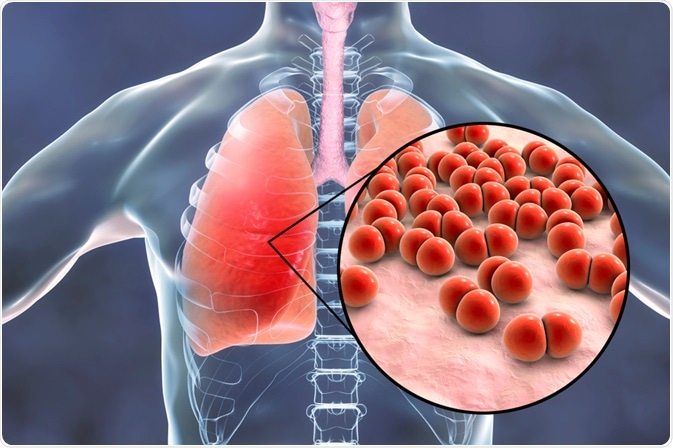Pneumonia is an acute lung infection in which the alveolar sacs become inflamed, filling with fluid or pus. These lung secretions cause deep coughing, labored breathing, and often limit proper oxygenation of the blood. Other symptoms include fever, chills, nausea, headaches, muscle aches, and chest pain.
 Image Credit: Kateryna Kon/Shutterstock.com
Image Credit: Kateryna Kon/Shutterstock.com
For most of the population, pneumonia is highly treatable; however, in certain cases, pneumonia can develop into a severe medical condition that requires hospitalization, and if left untreated, can result in death.
The severity of disease, and therefore the necessary treatment regimen, is often associated with the general health and age of the patient prior to getting sick.
Treatment in normal healthy adults
For young and middle-aged adults who have contracted community-acquired pneumonia and who were in good physical health before getting sick, treatment typically occurs at home.
The general course of treatment includes fever reducers (such as non-steroidal anti-inflammatory drugs [NSAIDs], acetaminophen, and aspirin), plenty of rest, and lots of fluids to loosen up mucous deposits.
In addition, a course of antibiotics may be prescribed if tests indicate that the causative agent is bacterial. A doctor will prescribe the antibiotic based on which species of bacteria are being targeted.
Patients with viral-induced pneumonia will not receive antibiotics since this form of medication is not effective against viruses. However, these patients may benefit from antiviral medications.
Cough suppressants are generally not recommended because the coughing reflex is necessary to break up and remove mucous deposits.
Suppressing this reflex can make matters worse. Young adults may begin to feel better after one week, while recovery in middle-aged and older adults may take several weeks.
Because pneumonia can recur, it is important for a patient to fully recover before resuming normal activities.
Pneumonia - causes, symptoms, diagnosis, treatment, pathology
Treatment in at-risk populations
Pneumonia infection is especially dangerous in children under age 2, adults over age 65, and in patients with an underlying chronic disease such as heart, lung, or kidney disease or diabetes, or in those who have a weakened immune system due to chemotherapy treatment, HIV infection, or immune-based disorders.
Patients in these at-risk populations should seek immediate medical attention and often require hospitalization. Normal healthy adults may also require hospitalization if symptoms are severe or if previous rounds of antibiotic treatment were ineffective, causing symptoms to worsen.
Because of the serious nature of this type of pneumonia infection, strong-acting antibiotics combined with oxygen treatments are often necessary in order to fight infection and maintain proper blood oxygen levels. Recovery times for this population can be several weeks.
There are a number of preventative measures a person can take to decrease their chances of contracting pneumonia. First, a vaccine is available to protect against the bacteria Streptococcus pneumonia. It is strongly recommended that every child and all people in at-risk populations receive the pneumonia and the flu vaccine. Two varieties of vaccines are available.
The pneumococcal conjugate vaccine (PCV) is given to children, while most older adults (over age 65) receive the pneumococcal polysaccharide vaccine (PPV). Also, frequent hand washing, not smoking, and getting good nutrition and rest to bolster the immune system are all ways to increase the chances of avoiding pneumonia.
References
Further Reading
Last Updated: Jul 20, 2023